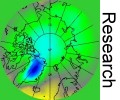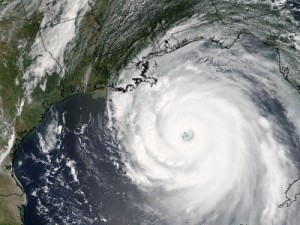 > ACCENT en > Special: Sept 05 Cyclones
> ACCENT en > Special: Sept 05 Cyclones
Tropical cyclonesClimate change cannot be accused of causing hurricanes but it could boost them.Special edition on the occasion of hurricane 'Katrina'
|
|
Tropical cyclones originate from the interaction of complex factors in the weather system. They depend on the sea surface temperature and on the multi-decadal oscillation of currents in the oceans as well as in the air. We can never ascribe a single storm to human interaction but the most recent research shows that the average destruction potential of tropical cyclones can be amplified by global warming. Cyclones, therefore, are becoming an increasing menace for the densly populated coastal regions of the subtropical and tropical latitudes. Content |
 |
Development, properties and impacts We study how a storm is formed from a low pressure system and where such storms occur. The damage caused depends not only on the storm force but also on the behaviour of the people. [more ...] |
|
 | Conditions for stormy times The Earth's rotation, high water temperatures and low wind shear let cyclones grow. The multi-decadal oscillation of global weather patterns also has an influence on the occurence of storms and makes it difficult to estimate the human influence. [more ...] | |
 | Warning for tomorrow We cannot assign the unusually strong hurricane seasons 2004 and 2005 to climate change. However, it is likely that the destructive forces of storms increase significantly in a warmer world. We have a look at the most recent estimations of climate research. [more ...] | |
 | Links Low pressure systems, storms and their impacts are not only interesting meteorology topics, but they are for many peoople of life determining importance. For this reason, there are many websites including explanations, observations and forecasts of such systems. [more ...]
| |
 | Information for teachers This special edition can be used in classes in the context of "weather / general atmospheric circulation". The ideal starting point is the topic: pressure systems and cyclones.
|

